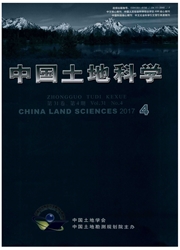

 中文摘要:
中文摘要:
研究目的:从土地利用的角度重新审视绿色空间的概念和内涵,建立基于土地利用类型的绿色空间生态评估体系,并将该方法体系应用于北京市通州新城的案例研究,度量绿色空间的生态系统服务功能价值。研究方法:生态系统服务价值评价方法、GIS技术、比较分析法。研究结论:基于土地利用类型的绿色空间生态评估,在土地利用规划及其相关生态规划中具有重要的实践意义,通州新城案例研究表明:通州绿色空间的主要生态功能在于废物处理、水源涵养、土壤形成与保护等非物质性生产方面;农田是通州绿色空间生态系统服务价值的最大贡献者,贡献率从2001年的47.4%下降到2004年的41.2%,林地贡献率则由14.7%提高到22.7%,其他各主要地类生态系统服务价值贡献比例随面积的增减也有显著的变化;河流湿地在提升区域绿色空间生态系统服务价值方面的贡献突出,改善水环境质量对建设通州“滨水宜居新城”具有重要意义。
 英文摘要:
英文摘要:
The purpose of this paper is to review the concept and meaning of green space, and to establish a land use based green space ecological assessment system which was used in the case study of Tongzhou to measure the ecosystem services value. Such methods were applied as ecosystem services value assessment, GIS and comparative analysis. The results indicate the land use based green space ecological assessment can be a practical tool in land use planning and related ecological planning. It is found that the main ecological functions of green space in Tongzhou District are insubstantial including rubbish disposal, water source preservation, soil formation and protection. Farmland had the largest proportion in total ecological value, which decreased from 47.7% to 41.6% between the year 2001 and 2004. The played an proportion of forest land in total ecological value increased from 14.8% to 23.0%. The wetland and rivers important role in improving regional green space ecological value. The proportions of other land uses in total ecological value changed dramatically along with the changes in areas. As a result, it is crucial to improve the quality of water environment in order to build a new developed livable area with beautiful waterscape in Tongzhou District.
 同期刊论文项目
同期刊论文项目
 同项目期刊论文
同项目期刊论文
 期刊信息
期刊信息
